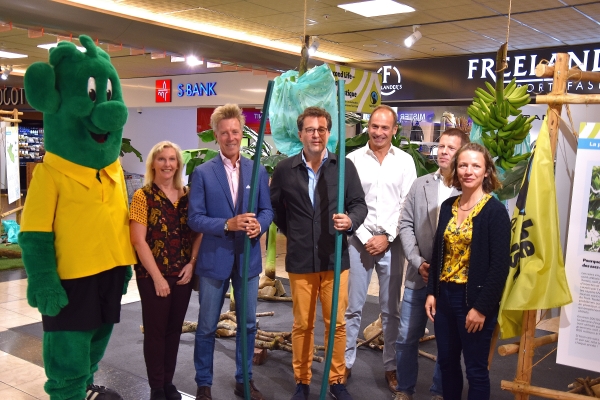
On Monday 12 September 2022, local non-profit organisation Fairtrade Lëtzebuerg, which celebrates its 30th anniversary this year, together with Cactus Luxembourg, presented an exhibition in the Shopping Center Belle Etoile on the circular economy pilot project set up by two Fairtrade cooperatives in the Piura region of northern Peru.
A complex context and issue
In order to produce quality bananas, the use of single-use plastic bags is a common practice in the banana sector. In many banana producing countries such as Peru, it is common for these plastic bags to be buried, burned or simply thrown away in a dump or landfill after use, or left on the plantation, the along the road or end up in waterways.
These blue bags, which are used to cover banana bunches, are used as soon as the bunches are formed and remain on them for about three months, i.e. until harvest. They help prevent infestation by insects and spiders, birds, as well as damage caused by the environment, namely dust, wind or even UV rays, and protect the fruit from extreme temperatures, while also helping to improve the external aesthetics of the fruit. However, these beneficial aspects mask different underlying problems, such as the lack of alternatives to plastic bags, the lack of know-how as well as the financing, which often prevent small producers from recycling used bags.
It is estimated that to date, around 500,000 hectares worldwide are devoted to the cultivation of export bananas. It is also estimated that 40 kg of bunch bags are used per hectare per year. In addition, nearly 20 million single-use plastic bags are used each year in the banana sector, i.e. 400 tonnes of plastic.
Fairtrade Lëtzebuerg clarified that each bag weighs between 20 and 25 grams, i.e. a total of 20,000 tonnes of bags, which represents 800 million to one billion bags used per year! If all these bags were lined up, assuming a length of 1.50 metre per bag, it would be the equivalent of 30 to 40 times around the world each year.
While significant measures have been taken in Costa Rica since the 1990s to address this sectoral problem, the crucial stage of plastic waste collection and recycling in Peru has long been problematic.
A visionary circular economy pilot project
In order to meet this major environmental, social and economic challenge, ECOBAN Srl - made up of different local cooperatives and associations, including two Fairtrade Peruvian banana cooperatives - was created in 2021 to ensure the management and proper functioning of the project on site.
Cactus Luxembourg via the NGO Fairtrade Lëtzebuerg wanted to support this pilot project from the start, which quickly enabled local players to start the construction of a recycling centre dedicated to the transformation of plastic bags into corner pieces, used to hold the banana boxes on the pallets, at the APPBOSA cooperative site in Samán Grande in June 2021.
Completed in October 2021, this brand new factory with an area of 1,225 m2 contains a main hall dedicated to production, a warehouse for angle irons and a small office for employees.
Following the installation of the first two production lines, the granulator and the extruder, a test phase was launched from November 2021 to January 2022 to ensure the proper functioning of the machines. The launch has been official since February 2022.
To date, more than 118,000 corner angles have been produced on two production lines (with a production capacity of 600 to 700 angles per day), i.e. nearly three million bags recycled. About 20-25 bags (one bag weighing about 20 gram) are needed to make a single corner piece two metre high.
Thanks to this project, a dozen workers from the region have already found stable and remunerative employment in the recycling centre, and due to the success of the project, two new lines, for a total of four lines of production divided into two workstations, are planned for the coming months with other job creations on the horizon. This point is significant in this region, where career prospects are quite limited.
Ultimately, this project not only has the potential to recycle all the plastic bags used on banana bunches, which would also make it possible to supply the entire Peruvian banana sector with corner pieces, but could indeed play a role of pioneer and influencer for other Peruvian associations and companies in other industries such as the avocado, lemon or mango sector, so that plastic waste no longer constitutes a distant memory in this South American country.
A democratic decision to finance the construction of the recycling centre
The brainchild of two Fairtrade banana cooperatives, this recycling centre was financed with the use of the Fairtrade premium, which is paid to producer organisations in addition to the guaranteed minimum price. The decision to use the premium to set up this project, which benefits all of the community was taken democratically with all the producers concerned. Miguel Morales Zapata, Production Manager of the Association of Organic Banana Producers Valle del Chira, said: “As partners, we all contributed together to make this dream a reality. It is very rewarding and we are very proud to be part of this model project, which helps us to maintain the environmental sustainability of an entire chain. This initiative was really born of the will of all the organisations to contribute to preserving the environment of our country".








